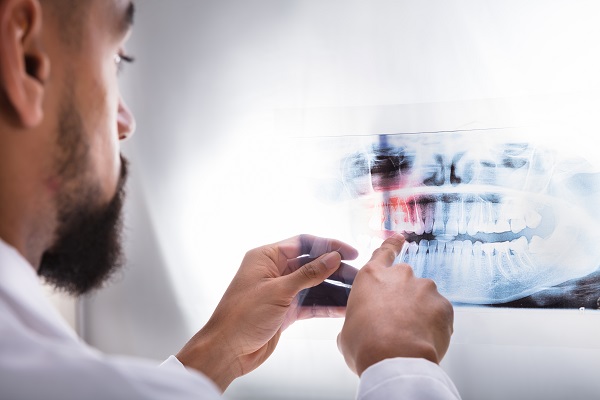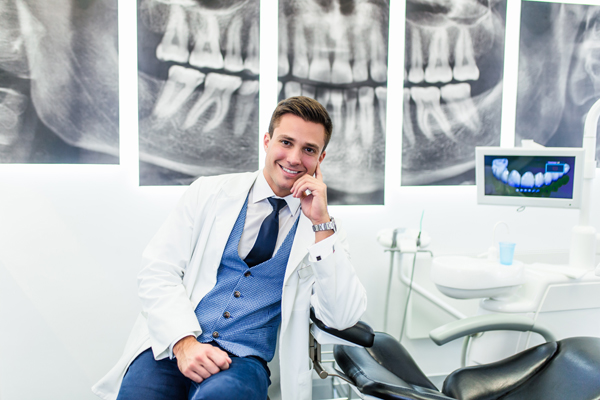General Dentistry: Why Do I Need X-Rays?

X-rays in general dentistry are useful for catching dental conditions that may not be visible to the eye. General dentists typically require patients to get x-rays at least once a year to ensure that the teeth, gums and jawbone are all strong and healthy.
There is a lot of controversy around x-rays in any type of medicine, dentistry included. Because x-rays expose patients to radiation, dentists try to avoid overdoing them. However, there is no proven evidence that dental x-rays are dangerous and general dentists rely on them to maintain a patient's oral and dental health.
Why are x-rays needed in general dentistry?
The following information outlines some of the reasons why x-rays are an important part of annual dental exams.
What are dental x-rays?
X-rays in general dentistry are also known as dental radiographs. When a patient needs an x-ray, the general dentist will use a special camera to capture images of the teeth and gums. The x-rays highlight the bone beneath the teeth, which allows for a closer look at the insides of the mouth.
What x-rays detect
X-rays are used in general dentistry to detect conditions that are not necessarily visible to the eye. A lot of dental problems occur internally and can only be seen through an x-ray machine. Some of the most common conditions that are detected through x-rays include the following:
- Oral cancer: Oral cancer is not always detectable when simply looking in the mouth. Oftentimes there are masses that cannot be seen with the naked eye. They may be beneath the teeth or housed around the jawbone
- Gum disease: Sometimes when gum disease first begins, there are no visible signs. General dentists can use an x-ray to see beneath the gums and examine the bone
- Cavities: Cavities often affect the internal parts of a tooth. Having an x-ray done can highlight cavities that have just begun
- Infections: Infections in the teeth or gums may not always show signs
- Bone loss: An x-ray can be helpful in locating bone loss behind the gums
There are many other dental and oral conditions that x-rays can detect. General dentists rely on x-ray machines to help maintain their patients' oral and dental health.
The importance of x-rays
X-rays in general dentistry are extremely important. There are a lot of oral and dental health problems that cannot be seen by the naked eye. A lot of cavities are detected through x-rays since they are not always visible to the eye. Without x-rays, general dentists may not be able to detect certain conditions.
X-rays are typically done in general dentistry once or twice a year, depending on the patient's health. People that are more prone to cavities or gum disease may be required to undergo x-rays every six months.
The bottom line
Questions and concerns regarding x-rays in general dentistry should be addressed by a dentist. Reach out to our office today to schedule a consultation.
Request an appointment here: https://www.schommerdental.com or call Schommer Dental at (563) 272-2331 for an appointment in our Davenport office.
Check out what others are saying about our services on Yelp: Read our Yelp reviews.
Recent Posts
Minor chips, cracks, and gaps in the smile do not have to be permanent. Dental bonding is a quick yet durable way to repair teeth with these cosmetic imperfections. With natural-looking results and minimal preparation, bonding can support oral health and restore the smile to its prior radiance.Dental bonding is a cosmetic procedure in which…
Oral health needs change as we age, and seeing a family dentist can play a big role in maintaining a healthy smile and boosting overall well-being. Family dentists are general dentists with the expertise to manage the unique dental challenges associated with aging. They provide personalized care that focuses on common and specific needs, ensuring…
Full mouth reconstruction refers to the comprehensive process of restoring or replacing all the teeth in the upper and lower jaws. Patients with extensive dental damage from decay, trauma, wear, or congenital conditions may benefit from this transformative treatment. While a full mouth reconstruction can significantly improve oral health, function, and aesthetics, understanding its advantages…
Partial dentures are a great way to improve your smile, oral health, and ability to function by replacing missing teeth. It is helpful to have a full understanding of what partial dentures are and why they are often the more preferable treatment solution for patients to decide if treatment is right for you.This review defines…


